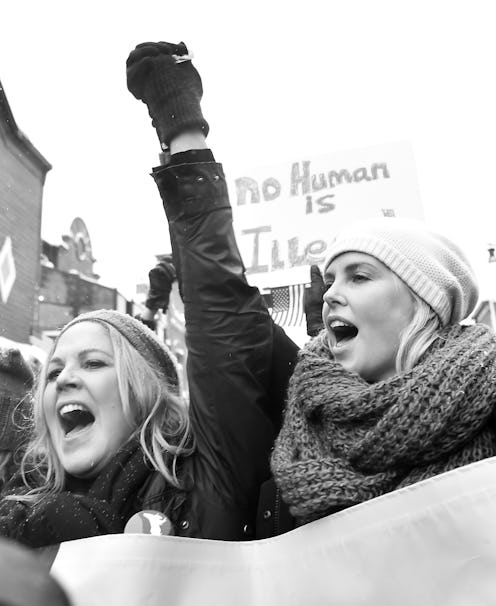News
What To Tell People Who Say Protests Don't Work

The Women's March had more attendees than the presidential inauguration, but will that have a lasting impact on ensuring equality for all Americans? The short answer: yes. But that's with one caveat — people need to show up and keep showing up. Here's what to tell people who say protests don't work.
Some people argue that protests don't work. And there's something to the argument — not only have the number of people turning out to protests dwindled since the Civil Rights Movement. Doubt has especially set in after the Occupy Wall Street movement, where social media has sometimes had a negative impact on organizing, according to some experts. In an opinion piece in the New York Times, Zeynep Tufekci, assistant professor at the University of North Carolina and a faculty associate at the Berkman Center for Internet and Society at Harvard, explained how there are still obstacles to overcome in the age of digital organizing:
This muted effect is not because social media isn’t good at what it does, but, in a way, because it’s very good at what it does. Digital tools make it much easier to build up movements quickly, and they greatly lower coordination costs. This seems like a good thing at first, but it often results in an unanticipated weakness: Before the Internet, the tedious work of organizing that was required to circumvent censorship or to organize a protest also helped build infrastructure for decision making and strategies for sustaining momentum. Now movements can rush past that step, often to their own detriment.
According to a 2008 interview with NPR (so before Occupy Wall Street and Trump's election), one of the last times a protest created a measurable change, according to Columbia professor Dana Fisher, was the South Africa apartheid protests on college campuses. "Students on campus built shanty towns, continually embarrassed administrators and made clear they were supporting pulling out of investments in South Africa," she said.
The difference is, according to Fisher, "There needs to be a representation of the population that's willing to sacrifice their time, at least ... you need people coming out on more than one day. You need sustained action. You need people to go home and continue to show their dissatisfaction. They need to make it clear they're not going to take it any more. They need to show politicians that change is required."
Aziz Ansari couldn't have said it better in his powerful and inspiring opening monologue on Saturday Night Live last Saturday... and I can't stop watching it:
He said:
"I want to leave you guys with a serious thought. I know there's a lot of people that are worried right now. It's a weird time. If you're excited about Trump, great, he's president, let's hope he does a great job. If you're scared about Trump, and you're very worried, you're going to be OK, too. Because if you look at our country's history, change doesn't come from presidents. Change comes from large groups of angry people. And if day 1 is any indication, you are part of the largest group of angry people I have ever seen."
So, here's the thing. Yes, many protests aren't effective, but there is tremendous potential for them to work because "change comes from large groups of angry people." Ansari is right — if there's one thing I learned from my late father (and there are many more than one), it's the sentiment behind the quote he often botched about how 80 percent of success is showing up. He'd add, "Marge, you gotta go to the stuff."
Go to the stuff and stay nasty.